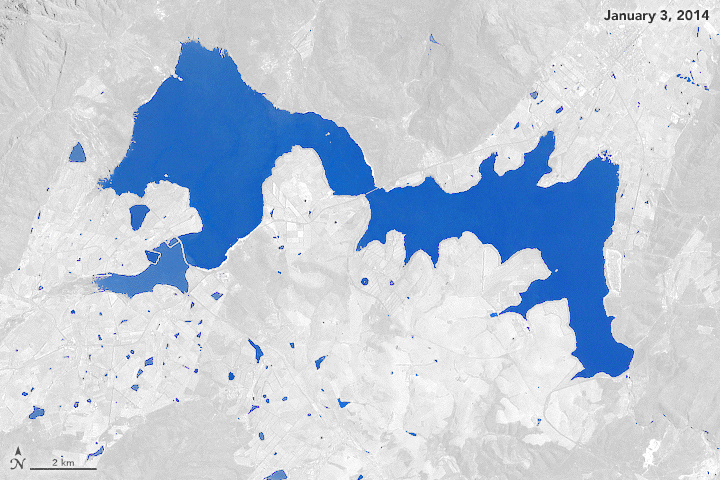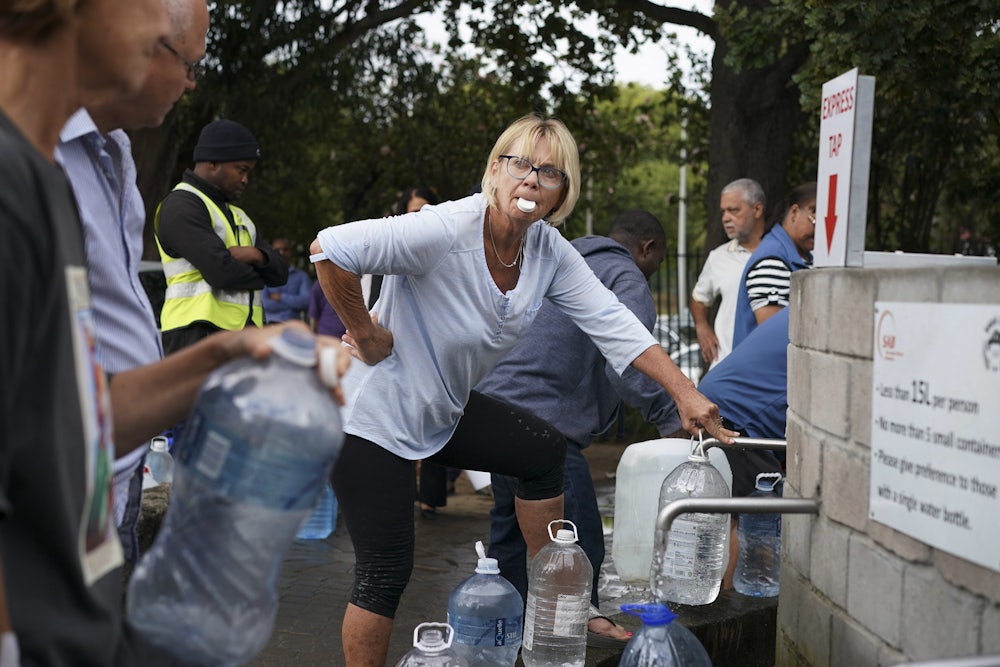They’re calling it “Day Zero”: the day when drought-stricken Cape Town, South Africa, will be forced to shut off the taps and ration drinking water for its four million residents. “As things stand, the challenge exceeds anything a major City has had to face anywhere in the world since the Second World War or 9/11,” wrote Helen Zille, the head of government of the Western Cape province, predicting “conflict over access to water, theft of water, and other criminal acts associated with water, not to mention the outbreak of disease.” If the drought continues, Day Zero will arrive in Cape Town in less than three months.
But there are more Day Zeroes to come, including in the United States. That’s not hyperbole, but a routine warning climate scientists have been publishing in scientific journals for years. These studies say that global warming, if it continues unabated, will cause longer and more severe droughts in already-dry places, thereby threatening drinking water supplies around the world.
Droughts happen all the time, all over the world. A few are happening in America right now. They cause water shortages because, for the most part, the water we use for drinking and bathing and flushing toilets comes from man-made and natural lakes (also known as reservoirs), rivers, and groundwater. All of these sources depend on precipitation—rain and snow—to remain full. Cape Town’s largest reservoir, which is supposed to provide about half of the city’s water, is rapidly dwindling due to three years of poor rainfall—the area’s worst drought on record.

But Cape Town’s crisis has been exacerbated by the national government’s failure to prepare for such an event, according to ostdoctoral research Fellow at the Global Change Institute. Writing in The Conversation, Olivier said that while Cape Town’s local governments “went above and beyond what was required to prepare for drought,” the ruling African National Congress failed “to acknowledge or respond to provincial and municipal calls for help,” and allowed far too much water to go to agriculture instead of the city’s residents.
This situation isn’t unique to Cape Town. Reservoirs and groundwater systems are dwindling in populated areas all over the world, due both to demand and drought: A USA Today investigation found that aquifers are being rapidly depleted “from the United States to Asia, the Middle East, Africa and Latin America.” In the United States, the largest reservoir in the country—Lake Mead—lost more than half of its water from 2000 to 2015. According to Arizona Public Media, the lake that provides water to Arizona, Nevada, and California is still shrinking, hovering close to levels that would trigger an “official shortage,” and thereby water rationing. Brasília, the capital of Brazil, with a population of 2.6 million, has already declared a state of emergency due to long-term drought, but is only one of 800 municipalities across Brazil where water is being rationed.
As the global population grows, demand for freshwater all over the world is increasing. So how could there not be another Cape Town? “If there is no rain, Cape Town will be the first major city in the world to run out of water, but it probably won’t be the last,” Nathalie Baptiste reported this week for Mother Jones. She quoted Bolivian President Evo Morales, who spoke at the United Nations last year. “If current patterns of consumption continue unabated,” Morales said, “two-thirds of the world’s population will be facing water shortages as a daily reality by 2025.”
Scientists can’t yet tell how much climate change influenced the severe drought in Cape Town. That determination will come later. (Scientists just recently found climate change caused at least 15 percent of Hurricane Harvey’s rainfall.) But they’ve been warning about the possibility of such a drought in the region, and they know it will become more likely as the planet continues to warm. “This is certainly something that provides an outlook on the kinds of risky situations we might see as the world warms,” said Rachel Licker, a senior climate scientist at the Union of Concerned Scientists.
There’s still time to prevent the next crisis. Government officials can mandate carbon emissions reductions to prevent catastrophic climate change. They can update crumbling infrastructure so water isn’t wasted. (America’s water infrastructure is insanely leaky, but would cost $1 trillion to fix.) At the World Water Forum, taking place next month in Brasília, countries will discuss the idea of sharing water systems to promote efficiency.
For now, Cape Town is implementing a short-term solution: extreme water conservation. On Thursday, the government reduced the daily consumption limit from 87 to 50 liters. That’s increased the hardship for residents right now, but over time, such measures could change the culture around water consumption. “We should be asking ourselves how might we redesign our homes and cities to make conservation efforts easier and optimize our natural resources for the long term on a large scale,” Dianna Kane, who lives in Cape Town, wrote Thursday in the New York Times.
The world can learn a lot from Cape Town’s tragedy. “Experiences like these challenge our perceptions of what we need and of what’s precious,” she wrote. “You could think of it as practice for what’s to come.” Given what we know about the worsening impacts of climate change, every city should start practicing now.
